Its into NSW for November.
First stop is Moree population 16,000
or thereabouts , about the size of Benalla maybe a bit bigger.
We are 119 km into NSW into the cotton
growing area..
We stay at the Gwydir caravan park
again as this has 5 artesian pools you can use all day . 4 of the 5
pools go from 32 to a hot 39 deg c and a cooler 25metre to swim in
which it is still artesian water but cooled a bit more to 28deg.
There is a Coles and a Woolworths here
so we do some shopping and spend most of our days here in and out of
the pools. We do get a storm which empties the people out of the
pools , its not the rain but the lightening thats bad if you are in
the pools.
The first place in the caravan park
they gave us to park in was no good. As we pulled up the neighbours
told us they had asked to be moved because the mob of local fruit
bats had decided they liked the nectar in the flowers of the trees
beside them. So their car and caravan was covered in not only flowers
and nectar and pollen but fruit bat droppings as well,---hard to get
off if allowed to get too dry. So we asked to move too and ended up
closer to the toilets/ showers and the pools-good.
After a few days we move on to
Gravesend well just on the outskirts on the Gwydir river at Ezzy's
crossing. We have been here before and we still have had no luck at
fossicking here.
We move to Cranky rock nature reserve
8km from Warialda stopping in town for the fossicking maps. We have
also been here before looking for garnets and agate and jasper. I had
no luck this time but the water between the granite rocks was cool
for a swim and the turtles are still here and swim with you. There is
peacocks roaming around here loose and a couple of emus that come
into camp. There is also a possum with one eye and very little sight
in the other that calls this place home.
We go into Warialda on our way south ,
pulling up at a parking area for vans so we can walk around the
Koorilgar nature reserve , its a 7km loop which goes out into the
bush and back to the other end of town. Had lunch in caravan then
Larry walked along Reedy creek in town while I sat and did some
crocheting.
We stayed the night at TI Tree creek
rest area and went on to Bingara the next day.
Bingara pop 1300
Gold was discovered here in 1852, this
brought prospectors and a town was started in 1880.
Then copper and diamonds were
discovered and it became the largest producer of diamonds in
Australia for awhile in 1880s.
There is a free camp along the Gwydir
river so we parked here for a couple of days and went fossicking.
We went to Ruby hill looking for
garnets. Like other places the miners here thought they had found
rubies but no they are Pyrite red garnets.While I searched the creek
bed Larry went off walking to see what he could find that had
feathers -as usual. Then we both went searching around the ant's
nests in the stuff they bring to the surface as they dig out their
holes. This is where some small garnets are found. Well we only found
tiny speck but made the ants very mad at us, as we had to use pick
axe in the very hard mound.
Then we checked an old Rhodenite mine
for its soft pink with black manganese rhodenite. This is not hard
enough for me to do anything with.
Bora creek was searched for jasper.
Found a Nobbi dragon sitting on a fence post.
We did find water dragons back at camp
on the Gwydir river while walking its banks.
The Gwydir shire is a volcanic area and
has places where glaciers where once. This is shown by the marks left
by the rocks being moved by the ice movement. These rocks where once
on the ocean floor 580 million years ago.
Our next place is Barraba at Glen
riddle recreation reserve for two nights. There was not much water in
the river but we found a kite with its nest in the tree opposite and
roos up a bit further coming to the river to drink. There were 5 vans
parked here. It would be nice with a little more water in the river.
We moved on to Split Rock dam. Here we
also found very little water and it was getting cloudy and looking
like rain and this is all loose dirt so we moved to Lake Keepit.
We have been here before and were not
sure whether it was worth it but we needed some where to go.
It rains and there was not much water
here either. It was too cold to swim and then we got thunder storm.
We did manage some walks and found some birds and swamp wallabies.
This place has cabins, powered sites
and bush camping. The gate to enter and pay is a couple of kilometres
away from campground and the site we have been given is no good for
our big van, so you have to ring the office to get it changed. We
were told to park were we could fit and ring back. Im glad we moved
as a group of very loud campers arrived taking over 4-5 sites were
we to be. We did get a bit muddy where we picked but it was the
end of the row a bit away from all the noise.
We decided we would go into the
Warrambungle national park again, it was good last time here.
This is an area of former volcanic
eruptions some 13-17 million years ago. So its interesting some of
the rock formations on some of the walks. We walked the Belougery
flats walk of 5klm on the valley floor with just little up and down
bits. The Wambelong nature track is 3klm crossing the creek with some
steep sections close to the canyon wall and volcanic boulders. You
can also go up to the lookout for views of the area.
Tara cave walk is 3.4klm across the
Wambelong creek through eucalypt woodland then climb steeply to the
cave area,There is a walking platform to see enclsed area of the
caveswith there drawings.
Burbie canyon 4km circuit along Burbie
creek . A dry creek bed and everything is dryer than last time here.
Not everything has been replaced after
the 2013 fires but the new information centre is nearly ready to
open.
Alot of nesting boxes have been put out
for birds and sugar gliders and possums that would have used the
hollow bits of the trees before they were burnt. The rangers tell us
that things are returning and breeding so thats a plus.
On our walks we did find Lace monitors,
some skinks and dragons. But along with the returning wallabies and
roos are some ferral goats that are rounded up every few months as
they are destroying the new growth of trees, bushes and understory
plants which allows for weed growth.
One young roo female keeps hanging
around the caravan door and follows us when we go outside. She has
obviously been fed by campers and that will not help here survive
either. When talking to the rangers they say they think she might
have been hand reared locally after the fire and was dumped in the
park latter. I wonder if it was them.
There are a few longer harder walks
that we did last time here but as it is dryer most of the wildlife
are staying close to any water left in the creeks. And of course we
are not quite as fit as before when we were here.
It was time to move on to go to the
coast and a visit to family in Tilba Tilba before heading down the
coast into Victoria and around and back up to Benalla and Shepparton
for Christmas with family there.

 Moree, New South Wales, Australia
Moree, New South Wales, Australia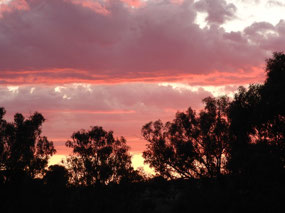
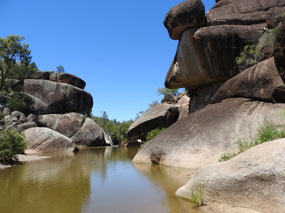
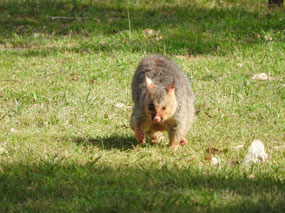
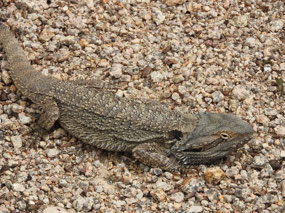
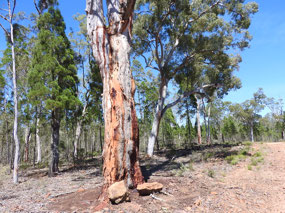
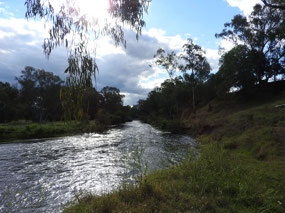
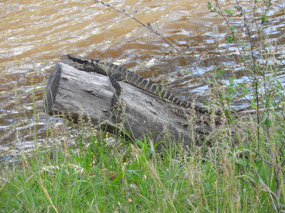
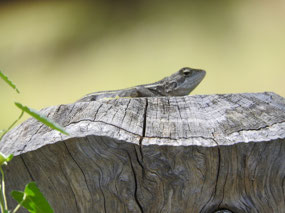
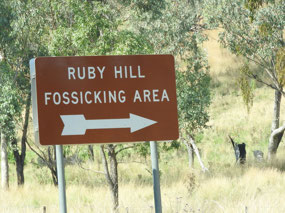
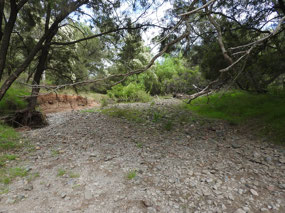
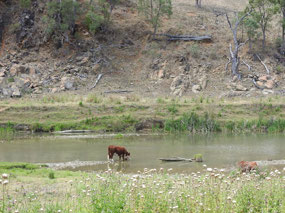
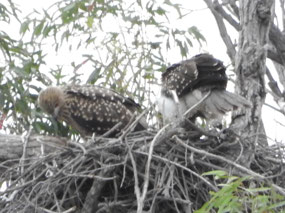
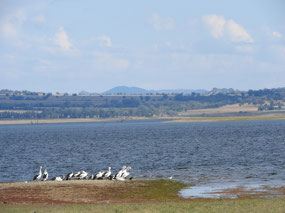
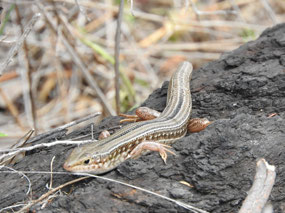
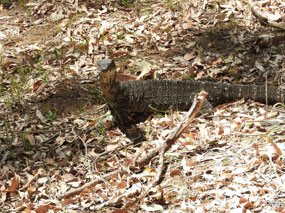
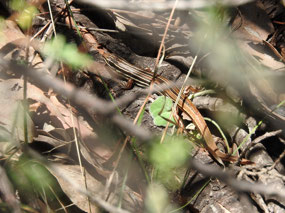
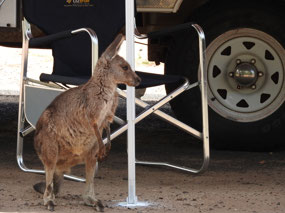

2025-05-22